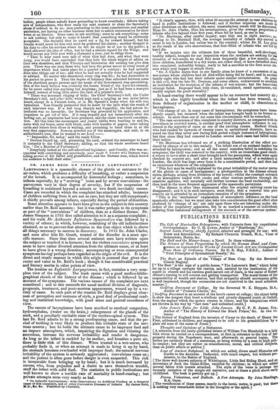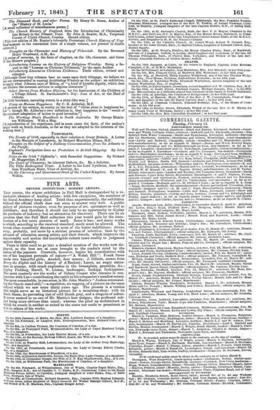PUBLICATIONS RECEIVED.
BOOKS.
The Life of 211aximilien Robespierre-' with Extracts from his unpublished Correspondence. By G. H. Lewes, Author of " Ranthorpe," &c. Sacred Latin Poetry, chiefly Lyrical, selected and arranged for use: with
Notes and Introduction. By Richard Chenevix Trench, M.A., Vicar of
• Itchenstoke Hants, &c. The Hall and the Manor-house; a Novel. In three volumes. The Science of those Proportions by which the Human Head and Coun- ce as represented in Works of Ancient Greek Art are distinguished row those of Ordinary Nature. By D. R. Hay, F.R.S.E., Author of " First Principles of Symmetrical Beauty," &c.
The Rest; an Episode of the Village of Ross Cray. By the Reverend Claude Slagnay. (" The Rest " is the sign of a public-house, " The Labourer's Rest," which being set up in a village corrupts the rustics, and, assisted by the inattention of the squire in church and his careless good-nature out of doors, is the cause of Robert Athaut's turning to evil courses and getting transported. The moral theme of the responsibility of wealth and station, and that sympathy should accompany gifts, is well impressed, though the accessories are not contrived in the most artistical, manner.] Godfrey Davenant at College. By the Reverend W. E. Heygate, M.A., Author of "Probatio Clerics," &c. [Godfrey Davenant is an account of the hero's career at college; the object being to show the dangers that beset a studious and piously-disposed youth at Oxford, from the neglect which the system creates in tutors, and the temptations which are thrown in his way by "fast men" and unlimited credit.] John Jones's Tales for Little John Joneses. By G. P. R. James, Esq., Author of "The History of Edward the Black Prince,"&c. In two vo- lumes.
[The history of England from the invasion of Cresar to the death of Henry the First, addressed to children, and supto be told to his grandchildren by a plain old man of the name of Jones.]
Thoughts and Opinions of is Statesman. [A selection from the lately-published letters of William Von Humboldt to a lady with whom he carried on a correspondence, at first in reference to the loss of her property during the Napoleonic wars, and afterwards on general topics. The letters are certainly those of a statesman, as being written by a man in high pub- lic employ; but they are rather on miscellaneous, moral, and critical subjects, than on public affairs or politics.]
Lays of Ancient Babyland; to which are added, divers small Histories not known to the Ancients. Dedicated, with much respect, but without per- mission, to the Babies of England. [The three well-known subjects of Whittington, Little Red Riding Hood, and an adventure of Jack the Giant-Killer, versified for children; to which are added several fables with morals attached. The style of the verse is perhaps tee formally imitative of the simple old narrative, and at times a pitch above early childhood. The book is prettily got up.] Poems, Valentines, and Ballads. A Few Attempts. By John Hardinges B.A. Oxon.
[The versification of these poems, mostly in the heroic metre, is good; but there is nothing very remarkable either in the thoughts or the spirit. 1 The Diamond Rock, and other Poems. By Henry St. Breen, Author of the "History of St. Lucia." [A small collection of miscellaneous poems.] The Church History of England, from the Introduction of Christianity into Britain to the Present Time. By John A. Baxter, M.A., Perpetual Curate of Christ Church, Coseley. Second edition.
I This new edition of Mr. Baxter's tolerantly Protestant Church History of Eng rand appears in the convenient form of a single volume, not printed in double columns.]
Thoughts on the Character and History of Nehemiah. By the Reverend Henry Woodward, A.M., &c. (A series of sermons, in the form of chapters, on the life, character, and times of the Hebrew prophet.] Introductory Lessons on the History of Religious Worship. Being a Se- quel to the "Lesaous on Christian Evidences," by the same Author. Introductory Lessons on Christian Evidences. Tenth edition, revised and enlarged.
[Although these tiny volumes bear no name upon their titlepage, we believe we are not unwarranted in naming Archbishop Whately as the author: an exhibition, to apply what Johnson says of Milton, of "a kind of humble dignity, which does not disdain the meanest services to religions literature."]
Select Stories from Modern History, for the Instruction of the Children of a Village School. St. Bartholomew's Day: Joan of Arc, or the Maid of Orleans.
[A little brochure, narrating events in a story-like way.] Essay on Human Happiness. By C. B. Adderley, M.P.
l[A species of lay sermon, in reality on the text of "virtue alone is happiness be- ow"; though Mr. Adderley's own definition is, that happiness is the happiness of the constant adaptation of action to good intention."] The Working Man's Handbook to South Australia. By George Blakis- ton Wilkinson. With a Map. rA reproduction of the experience, and in some cases the facts, of the author's forger work on South Australia, so far as they are adapted to the interests of the working man.]
PAMPHLETS.
The Events 0/1848, especially in their relation to Great Britain. A Letter to the Marquis of Lansdowne, by Richard Monckton Mines, M.P. Thoughts on the Subject of a Railway Communication from the Atlantic to the Pacific. England's Navigation-laws no Protection to British Shipping. By John
Bevan&
Notes on the Irish " Difficulty"; with Remedial Suggestions. By Richard H. Muggeridge, The Court of Chancery; its inherent Defects, &c. By a Solicitor. The Tithe Redemption Trust. A Letter to the Lord Lyttleton, from Wil- liam Wyndham Malet, Vicar of Ardeley, &c. On the Currency and Government Stock of the United Kingdom. By James %Min.























 Previous page
Previous page